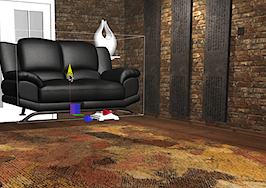Newly announced hardware from Magic Leap, a secretive Florida startup that’s drawn millions in funding from tech giants like Google, could provide a boon to real estate tech companies looking to bring augmented reality (AR) and virtual reality (VR) technology to consumers. However there are still a number of barriers to making AR and VR mainstream.
Magic Leap gave Rolling Stone magazine an in-depth look at the Magic Leap One Lightwear goggles at its Fort Lauderdale headquarters earlier this month. The product will also ship with a controller and a “Lightpack”—the latter a self-contained computer similar to a MacBook Pro or Alienware PC, according to comments Magic Leap founder Rony Abovitz provided to Rolling Stone. Abovitz declined to provide Rolling Stone with a ship date or cost, outside of noting just that first version will ship in 2018.
Since the company’s launch in 2011 behind Abovitz’s initial investment, Magic Leap has raised nearly $1.9 billion from major investors including Google, and China-based e-commerce company Alibaba. Despite the massive influx in cash, the company had been operating in stealth mode with little in the way of announcements or even tangible products. Yet the press surrounding Magic Leap has often been negative, including a high-profile sexual harassment lawsuit. Still, the company is surging ahead.
Jack Donovan, a software engineer with a separate startup called Irisvr is no stranger to the VR space. Irisvr builds software that allows architects and construction workers to automatically generate a VR experience of what they’re building without coding knowledge.
Donovan told Iman he believes Magic Leap’s product will be pretty similar in application to the Microsoft HoloLens, a rival mixed reality computing product from the company that makes the Xbox and Microsoft Office products such as Word and Excel, which was released in 2016 at a cost of $3,000, and has not yet seen widespread adoption.
“Seeing it now, it has basically the same features,” he explained. “It has volumetric capture so it knows the room you’re in, it has hologram projection.”
There’s one key difference, however, which Donovan believes could lead to a slightly better experience with Magic Leap’s product.
“What I’ve read from people that have experienced it — the holograms are fully opaque,” he added. “Whereas with the HoloLens you could kind of see through holograms that were projected.” This could mean that real estate developers could show off an apartment to a client with 3D holograms of custom furniture projected inside it, for example, perhaps lowering the cost of staging.

Microsoft Hololens Holostudio App promo image. Image: Microsoft
Magic Leap One also has a slightly larger field of view than the HoloLens according to Donovan — although it’s still not great which is one the technology’s big drawbacks, he explained.
“If you imagine taking an 8 by 11 sheet of paper and holding it at arm’s length away from your head, the space within the paper is basically all you can see projected at one time [with the Hololens],” he said. “That’s not super ideal for consumers that hear about this flashy technology. When they experience it they realize it’s not around them all the time — it’s projected in this relatively small light field.”
For the real estate industry, the VR benefits are obvious. Magic Leap can create a full, immersive experience. Through software from like Matterport, a virtual tour giant, and Planitar you will be able to walk through a property on the opposite coast from the comfort of your headset.
And there are also potential AR benefits, albeit less obvious ones.
“Viewing different furniture configurations and countertops, things that go inside of a building, are a pretty obvious use case for Magic Leap,” Donovan said.
Or if there was a building that was half-built, you could project new walls or renovations inside of it using AR, Donovan added.
The product also has eye tracking technology that monitors a user’s eye movements — which HoloLens doesn’t.
“Eye tracking would enable people in the real estate industry to measure how much time people spend looking at certain features or areas, and extract analytics to understand what about a property draws the most attention,” Donovan explained.

Magic Leap orange room promo image. Credit: Magic Leap/Facebook
Despite all of the upside, Donovan believe performance may be a challenge for some companies looking to use the headset, because of the computer pack.
“It’s not like they can just update the processor,” he said. “It’s more a matter of changing the design of their application to fit the hardware constraints of the platform.”
Constance Freedman, the founder and managing partner of Moderne Ventures — a venture capital fund that invests in real estate technology startups — believes the physical apparatus is what will continue to hold VR and AR headsets back.
“As long as there’s an apparatus involved, that’s a friction towards mass adoption,” Freedman said. “When you remove that apparatus, that’s when it can be a game-changer.”
“You still have to have the thing to use it,” Freedman added, noting that it comes with a price tag. “You still have to pick it up, or go somewhere to use it.”
Freedman said she welcomes the new technology in the space, but still thinks that barrier will prevent it from really making an impact on the real estate tech industry.
“It’s pretty normal to wear an apparatus while gaming,” she said. “But until we’re in the Ready Player One world — I think in the real world we’re not going to be wearing the apparatus.”
Both Donovan and Freedman agree however, that the technology is still in the nascent stage and there’s still plenty of room for AR and VR to work their way into the industry’s mainstream. Especially with more established companies such as Apple and Amazon investing in augmented reality in big ways.
For now, real estate pros are best advised to watch this space closely for emerging market opportunities.







